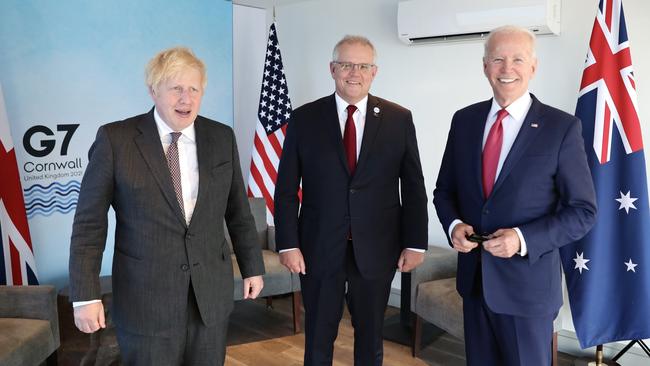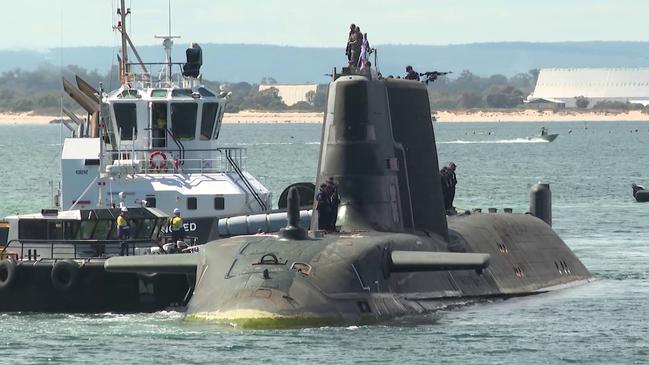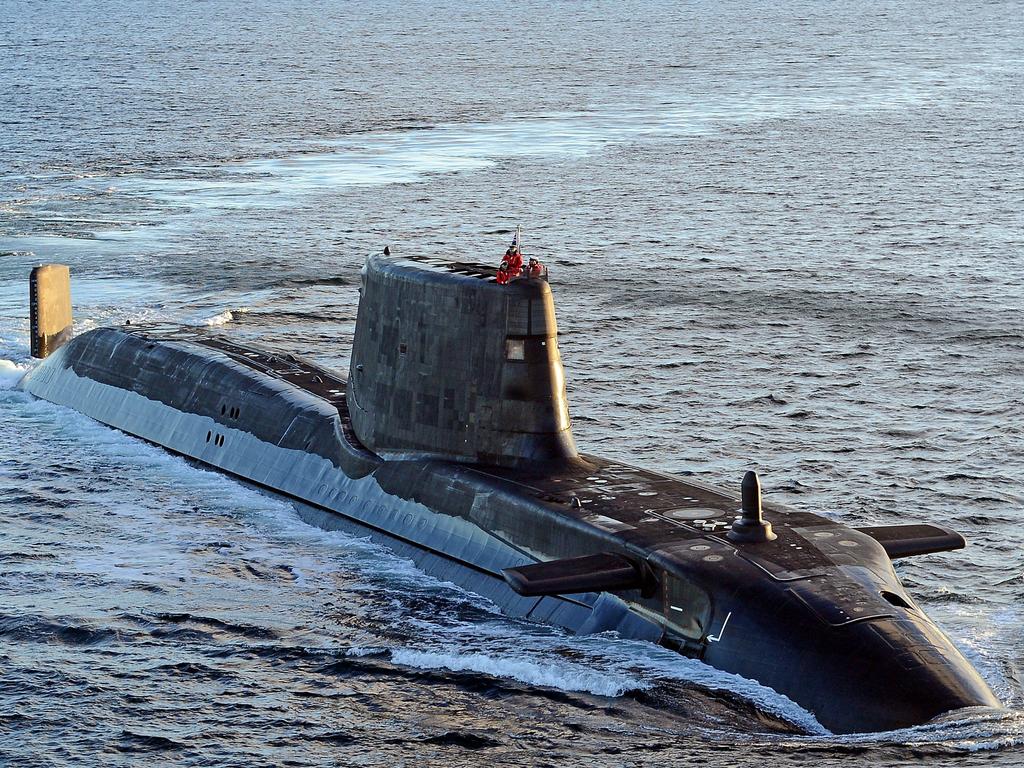Action stations: we need full steam ahead on AUKUS
AUKUS is already highly contested. Its success is by no means clear and the US President Joe Biden executed some extremely clumsy diplomacy of his own this week.

The government will also make strenuous efforts to accelerate the 18 months of initial consideration of what Australia requires in a nuclear submarine.
This consideration is being undertaken by a task force led by Admiral Jonathan Meade and supported by the Defence Department. Dozens of uniformed and civilian personnel have been directed at this task, and it is now hoped it will report in nine to 12 months.
The Biden administration has assembled a task force within the Pentagon to oversee its end of the Australia-UK-US defence technology alliance, which was announced in September.
The fate of AUKUS is already highly contested. Its success is by no means clear. US President Joe Biden executed some extremely clumsy AUKUS diplomacy of his own this week. But here is a core judgment – the Americans remain fully committed to AUKUS. However, both France and China are now active opponents of the deal.
They are formidable opponents and can be expected to make its life difficult. Within the vast US system, there are elements which are not keen on the agreement’s key note – sharing nuclear-propulsion technology with Australia.
Plus, the physical, personnel and political challenges remain enormous.
Within Australia, the greatest damage to AUKUS comes from the absurd timeline on which nuclear-powered submarines are to come into service. Commentators have not been making these timelines up. Senior uniformed and civilian defence personnel have told a series of Senate committees that the first nuclear sub is unlikely to arrive before 2038 at the earliest, with 2040 being a more likely date.
If that remains the case, then AUKUS will fail, because 2038 or 2040 is just too far away for tangible evidence of a replacement submarine for the Collins to emerge. And even if the submarine can arrive before then, the government remains culpable for its lack of defence effort concerning the next five to 10 years.
The prospects of Australia short-circuiting the absurd time frame by leasing one or more boats from the US or UK don’t initially look promising. We have no trained crew and no suitable facilities. The Americans and the Brits have no spare boats with relevant technology to lease. However, we can acquire crew and facilities fairly quickly if we really make it a national priority. And at any point in this process, political leadership at the level of the President and Prime Minister can override bureaucratic procedure.
If an American president decides it’s a priority, then he can lease us a boat. The best estimates I can find are that if everything moved at warp speed, five years would be the absolute minimum time we could get our first sub, perhaps essentially a training vessel. It’s more likely 10 years.
But five to 10 years, with a clear pathway mapped out in the very near future, means the timing for a nuclear boat becomes comparable with the timing for any new conventional submarine. However, so far this is all in the realm of speculation. One lesson the Morrison government must surely learn from the fiasco of the French submarine experience is that if it expects to be taken seriously with the proposition that AUKUS is of the first importance, it must drive AUKUS at the ministerial level and it must communicate seriously, repeatedly, almost continuously – formally and informally – with the electorate about it.

This week, I’ve had a series of conversations, on and off the record, with national security figures across both sides of American politics, people with extremely good levels of knowledge. One consensus point emerges. When Biden talked of the “clumsy” way that AUKUS was undertaken, he was venting against his own officials. It’s ludicrous to suggest the Americans at any stage did not know exactly what was happening between Canberra and Paris over submarines. It’s equally implausible that this agreement proceeded without those at the top of the White House knowing what was going on. However, it does seem clear that the Americans, like the Australians, did not foresee the extent and fury of the French reaction to losing the submarine contract.
Rich Armitage, deputy secretary of state under George W Bush, who is also greatly respected in Democrat circles and was chosen by Biden to travel to Taiwan on behalf of the administration, tells Inquirer: “The President’s comments to the French reflect his anger towards people in his administration, anger which has since abated a bit.”
How could it be that the estimation of the French reaction was inadequate? Says Armitage: “It was a very closely held process here in Washington, and similarly in Canberra. Very few people were involved and many (administration) positions here are still unfilled.”
Why was Biden annoyed with some of his own people? Armitage believes the President feels there was insufficient consideration for France as a NATO ally, and a nuclear weapons state, and insufficient notice to Biden of what to expect. But Armitage is very clear on another crucial point. The Biden administration, and the American system generally, remain fully committed to AUKUS. Armitage himself is strongly in support of AUKUS, but thinks “the delivery (of the submarines) is too slow”.
Biden has been criticised within America for what was not only an effusive effort to mollify the French, but also a clumsy and somewhat ambiguous set of remarks, which although they contained no criticism of Australia, certainly were construed as critical of Canberra by many analysts.
On their face, Biden’s remarks can read that way. Biden said to Emmanuel Macron in Rome: “What we did was clumsy. I was under the impression that certain things had happened that hadn’t happened. I was under the impression France had been informed long before that the deal was not going through. I honest to God did not know that you had not been.”
A tough-minded editorial in The Wall Street Journal was headed “Biden’s Australia Bungle”, and had the subhead “His remarks to Macron dent PM Morrison’s AUKUS strategy”. The Journal’s editorial commented: “Mr Biden’s comments raised fears that whatever Washington says about its Asian strategy, its European partnerships are the priority.”
A lot of pro-Biden Washington insiders dispute that interpretation, but the fact that it is the obvious way to read Biden’s remarks is undeniable. However, Biden engaged the French so strongly partly because they were implicitly threatening, as they often do, to effectively blow up NATO.
By the way, if you’re looking for ridiculous, self-indulgent, immature, and dangerous over-reaction, Paris is your first stop.
Beijing has a longstanding ambition to strategically detach Europe, or as much of it as possible, from the US. The French have, ingrained in their DNA, a suspicion and resentment of Anglo-Saxon power (to express a multifaceted historical complex crudely). Paris frequently promotes a basically absurd idea of European “strategic autonomy” from the US. The reason this is so ridiculous is that most European militaries are run down and their budgets feeble. Most of them would have trouble invading a soccer pitch. The EU lost its most formidable military power when Britain Brexited. Without the US, the Europeans can typically muster only volleys of press releases and battalions of blather.
But with Britain gone, France is the EU’s most significant military power. If it went down the European strategic autonomy road, it could seriously weaken NATO. So Biden had a genuine strategic purpose in trying to manage Macron’s tantrum.
Elliott Abrams, who was deputy national security adviser to George W Bush – and, though initially a harsh critic of Donald Trump, later served as Trump’s Iran guru – offers Inquirer his evaluation of Biden’s performance: “It’s hard to know what to make of Biden’s comment about having been ‘clumsy’.”
Abrams agrees the French could probably have been handled better, and at least offered some consolation prize: “What Biden actually knew, and when he knew it, is impossible to decipher. It is plausible he was told something and forgot it. I would not mind Biden’s comment if I were certain he is just trying to palliate the French, and realises that AUKUS is a deeply important agreement. I believe that to be the case but cannot be sure.”
Abrams completely reinforces Armitage’s judgment – which I also hear from Democrats – that AUKUS has overwhelming bipartisan support in the US, saying: “In this case, I believe we are on solid ground.”
Two other things out of Biden’s performance with the French. The Americans have decided definitively that Rome is the end of their apologies to France. Biden wiped away Macron’s tears, helped him blow his nose, patted him on the head – but that’s it.
The apology was delivered. It need not be repeated.
Most Europeans know and understand Macron and the French personality pretty well. Morrison didn’t receive any pro-French blowback in the many other meetings he had with European leaders. And politically, standing up to France is probably a net plus for Morrison.
The whole debacle with the French demonstrates how foolish it was to choose them for the submarine in the first place. Tony Abbott’s initiative to get Japanese submarines with deep American involvement would have been infinitely preferable. The Japanese system hadn’t quite come on board and so they didn’t submit the very best tender. But if Abbott had remained PM and negotiated the deal with Shinzo Abe, we would have got an excellent submarine, on time and on budget, with infinitely less fuss.
And because our submarine order would not have been commercially critical to the Japanese, if we had decided at some point to cut the Japanese order in half because we now wanted to go nuclear, the Japanese would have accommodated that.
Although the French bid was technically superior, boats on paper always look better than boats in the ocean. Everyone on the policy side in the Pentagon wanted us to go with the Japanese because of the congruence of strategic interests. The Japanese, and a lot of senior Americans, felt the Turnbull government would not go with a Japanese sub because the Chinese would have objected. And of course it would have been hard for Turnbull to carry out Abbott’s initiative. But governments make these decisions, not defence bureaucrats. Japan is vastly more important to us than France, and shares more regional interests.
Paris and Beijing will both now try to sabotage AUKUS. Beijing has campaigned quietly but strongly in Jakarta and Kuala Lumpur to demonise AUKUS and to raise the absurd proposition that it could lead to Australia acquiring nuclear weapons. Paris will try to fan worries, already present in parts of the US system, that because the nuclear subs use highly enriched uranium, they are a threat to non-proliferation.
In fact, the US is working intensely on producing uranium for use in submarines which is highly enriched but not weapons grade.
Abbott proposes to Inquirer that Japan should be invited into the Five Eyes intelligence club which involves the US, UK, Australia, Canada and New Zealand. Wellington’s presence in this group is an anomaly. Its only contribution is some South Pacific “listening” and there are still sharp restrictions on the level of US intelligence it is allowed to receive.
Armitage shares Abbott’s view that the Five Eyes should become Six Eyes by including Japan. Tokyo would need to develop parliamentary scrutiny of its intelligence services that was reliably confidential, and it would need a stronger, more robust legal sanction for government confidentiality, as well as some improvement in its IT security generally. But expanding the Five Eyes in this way would be a strategic win for everyone.
There is no personal chemistry between Morrison and Biden, though their relationship is perfectly functional. But AUKUS can only succeed with frequent presidential and prime ministerial input.
Given the messiness of Biden’s remarks on AUKUS, both Canberra and Washington need to reaffirm it. More than anything, they have to plot a path to nuclear-powered submarines for Australia this decade. The challenge is immense, and it all lies ahead.





The Morrison government and the Biden administration will within the next couple of weeks begin rolling out a series of announcements and initiatives under the rubric of the AUKUS deal to bring the agreement to life, and to demonstrate the work being done – now with some urgency – on the nuclear-propelled submarine project.